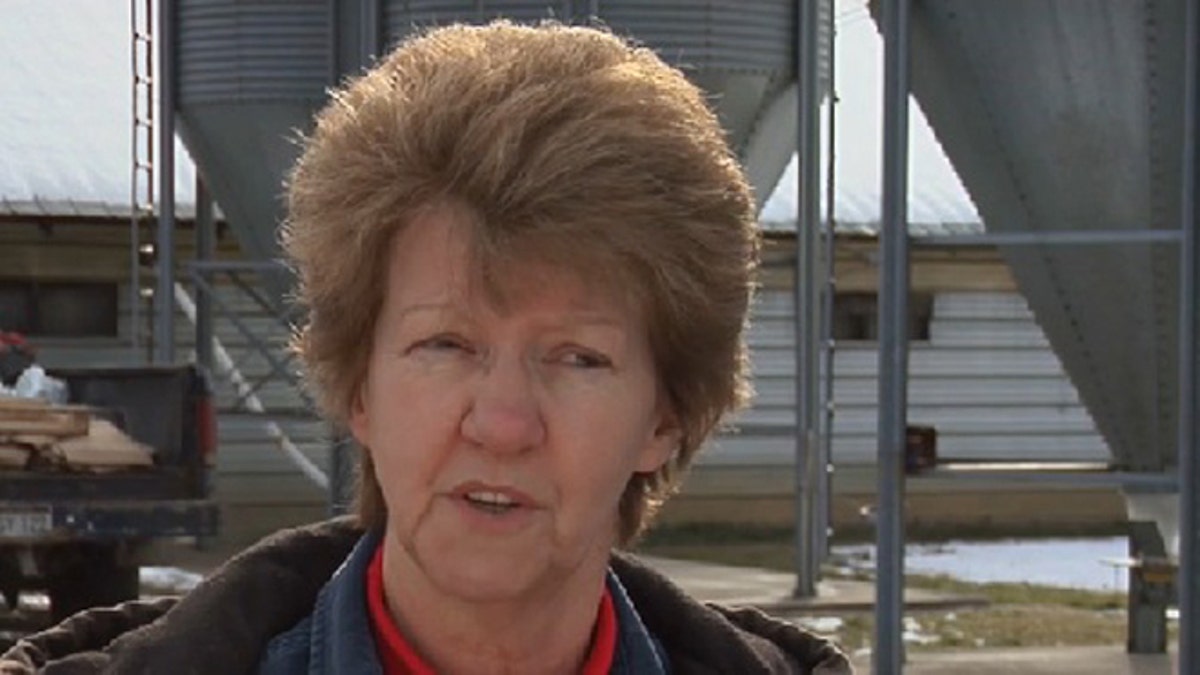
West Virginian Poultry Farmer Lois Alt filed a lawsuit against the EPA, alleging that she was threatened thousands of dollars in fines if she did not comply with environmental regulations based on inflated estimates of pollutants. (AFBF)
West Virginia poultry farmer Lois Alt didn't chicken out when the Environmental Protection Agency threatened her with fines of $40,000 per day, and even though the federal regulators eventually backed off, she's taking them on in a legal case that could benefit thousands of small farmers.
Alt, who owns the small Eight is Enough poultry farm in the town of Old Fields, was hit with the fines after EPA officials claimed high levels of nitrogen in her chickens' waste were fouling waterways. She fought back by filing a lawsuit of her own in federal court of the Northern District of West Virginia, and although the EPA dropped the fines, a judge has kept the case on the docket. Alt's lawyers argue the EPA is wrong to deny small operations like hers the Clean Water Act's statutory exemption for “agricultural stormwater," which big farms get and believe the massive agency has to change its rules - and use better science.
“[T]his Court’s ultimate decision on the merits will benefit all parties, including EPA and many thousands of farmers, by clarifying the extent of federal CWA ‘discharge’ liability and permit requirements for ordinary precipitation runoff from a typical farmyard,” the court ruled in rejecting the EPA's bid to have the case dismissed.
Alt's case could get a boost from a new University of Delaware study, which shows the EPA has been overestimating the environmental effect of runoff from feedlots and small farms like Alt's for years. The study found that the level of nitrogen found in chicken manure is 55 percent lower than the decades-old standards set by the EPA. Those findings could give Alt and her legal team powerful ammunition when they go to court on behalf of small farmers everywhere.
“Ms. Alt has courageously taken on EPA not just for her own benefit, but for the benefit of other farmers,” said American Farm Bureau Federation President Bob Stallman. “She refused to back down from her principles despite the best efforts of EPA and environmental groups.”
[pullquote]
The Delaware study raises the possibility of many farmers having been wrongly fined for polluting the ecosystem in the past, a prospect that would only confirm the suspicions of farming advocates.
“For me, it is not surprising, because the way in which the EPA works…it does not have a whole lot of credibility,” Don Parrish, the American Farm Bureau Federation's senior director of regulatory relations, told FoxNews.com. “They do have positive goals, but there’s a real disconnect in the nature of interpreting science in modern agriculture.
“It’s a systematic application that is putting farmers in a negative light,” he added.
The EPA did not return requests for comment.
The study, which looked at farms in Delaware, Virginia and West Virginia, found that the EPA standards did not reflect genetic modifications and improved farming techniques that have had a dramatic effect on the farm industry's environmental footprint. One case study showed that poultry plants in Sussex County, Delaware, generated 261,723 tons of manure in a single year, yet the EPA models assumed they produced 1.5 million tons.
“[The] findings are significant because they represent the most current data available, based on tests of thousands of samples of actual manure, not estimates,” Dan Shortridge, spokesman for Delaware Department of Agriculture, which participated in the study, told FoxNews.com. “When making decisions and forming policies and goals -- especially about our environment -- it is important to have the most accurate data, and that's what this represents. What this provides policymakers is a detailed look at the actual effects of manure, and it appears to be less than everyone had thought.”
The inflated numbers could indicate small farmers have faced unjustified fines for years, if not decades. Alt was threatened with daily fines in 2011 unless she obtained a Clean Water Act discharge permit for rainwater runoff that made its way from her coops to local waterways. With the backing of the West Virginia Farm Bureau and the AFBF, she sued to challenge the permit order. The EPA backed off, but Alt's lawsuit is still pending.
“The EPA seems to have believed if it withdrew the order against Ms. Alt, the court would dismiss her lawsuit,” said Stallman. “The tactic failed because the court recognized EPA wasn’t changing its underlying legal position, but just trying to avoid having to defend that position.”
The court denied a motion by the EPA to dismiss the lawsuit and scheduled a hearing for June 1.







































